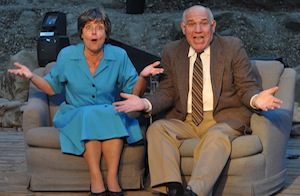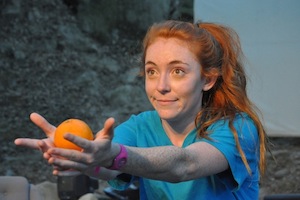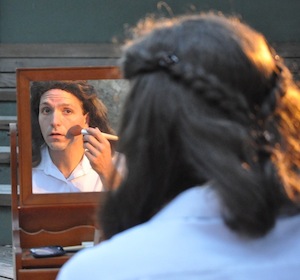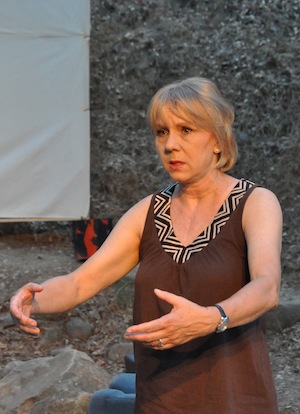Tone Clusters by Joyce Carol Oates Aug 2013
Joyce Carol Oates’ “Tone Clusters,” now being performed through October 12 at Will Geer’s Theatricum Botanicum in Topanga Canyon, would be a thought-provoking, current piece of theatre at any time. And the audience in the premiere sold out performance proved that the three-time Pulitzer Prize nominee, multiple award-winning author’s work was the perfect grand finale to the Theatricum’s 40th Anniversary Season.
Six performances (September 12, 19, 26 and October 4 and 12 will each be followed by an audience talk-back. The first honored the magnificent, demure Ms. Oates, who was brought to the theatre for the Los Angeles premiere.
Her prescient subject in 1990 was the 24/7 news cycle and how it gobbles up people’s lives to fill time. Based on a a true-life story, a suburban husband and wife in the main poem-play sit in the spotlight of aggressive media attention after their son is arrested as the alleged killer of a neighborhood girl. Four short monologues round out the evening.
This reviewer scribbled four pages of notes in the dark, for example, and although the ideas of the play were definitely internalized, alas, the writing is illegible in the light. Those ideas involve the notion that every person remembers the same incident differently, and with time, even one person’s memory, interpretation and telling of an event changes. When the TV show on the stage is stopped for technical reasons and reshooting is necessary, the couple struggles to remember their personalized version of events the first time around in order to repeat it “accurately.”
The insistence of proving a person’s innocence and non-violence as a normal person because they might otherwise follow everyday patterns is a recurring theme. The mother’s way of saying her son is normal, for example, is that “he was a good eater.” So are the recitals of everyday life that may foretell disaster, and thus stop in mid-sentence, such as, “he had a temper like his fath—-.”
The fact that this play about the insistent barrage of news in the 24/7 news cycle enveloping us was written in 1990 is remarkable. In the words of director, Mike Peebler, “It’s about the ‘spectacularization’ of tragedy in our culture. It’s about the way we take horrible events and turn them into a product to be consumed, passing instantaneous judgment and dehumanizing those involved in the process” — here two parents trying their best to describe the events surrounding their son, who was arrested as the alleged killer of a neighborhood girl.
The TV show home invasion comes complete with the somewhat disembodied voice of the interviewer (at times the commentator and/or interrogator, Jeff Weisen) and on-site TV monitors. In this version, the director chose to set the story in 2003, which was the year that the Iraqi war started.
In the Directors’ Notes, Peebler adds, “The Gulick family is dealing with its own tragedy, and amid their own blind denial of the truth, we see the tragedy on top of the tragedy – the dehumanization and spectacularization of strife. Add to this the need for them to face, unseeing, an all-seeing public.

Three monologues lead up to the play. The first is “I Stand Before You Naked,” with Jonathan Blandino, Cynthia Kania and Sarah Lyddan, followed by Blandino in “The Mirror,” Lyddan in “The Orange,” and Kania in “Slow Motion.”
The author herself was lavish in detailed praise of the direction and the players during the colloquy that followed the first performance here in Los Angeles, which made the evening momentous, and even one of greater satisfaction to watch the cast receive such an immediate and positive review from the writer.
What made it even more fascinating was Ms. Oates’ personal explanation of how the play came to be written from her poems. And, in fact, my theatre companion-poet said she could hear and almost see the words in groups on a page). This, said Oates, gave the actors and director even more freedom to interpret her words.
Ms. Oates was most interested in the interpretation of the monologues by the actors and we in the audience were privileged to see the interaction, starting with the time frame set by the director. She was very curious about the process that Sarah Lyddan engaged in for “The Orange,” an ode to a piece of fruit by a young lady who was starving herself. It was easy to see that Lyddan, an ageless and marvelously lithe combination of Sissy Spacek and Sammantha Eggers, totally pleased the author.

While the two women and a man did the opening, “I Stand Before you Naked,” Ms. Oates revealed that her original vision was of ten women — which is how it was first performed. In “The Mirror,” a piece about someone afraid to show their inner identity anywhere but in the mirror, the audience speculated that this could be done by a woman, although it was flawlessly performed by Jonathan Blandino.

If the words “graceful,”and “Lithe,” abound here, they capture the feeling of the actors. This feeling was even more pronounced in the words of Cynthia Kania in “Slow Motion,” the poem about how moments leading up to a major event slow down so much they seem to almost stop time. The photo below actually symbolizes this dance feeling since Kania, in ballet terms, is in fourth position!

It is always surprising to find that that there are still local residents who have not visited Will Geer’s Theatricum Botanicum (1419 N. Topanga Canyon Blvd, topanga, CA 90290, midway between Pacific Coast Highway and the Ventura Freeway).
The two rustic outdoor amphitheatres are terraced into the hillside so that it is often tempting to just relax and gaze at the trees and the sky — even though the “seats” are long benches with a seat cushion. “Tone Clusters” was in the smaller, 95-seat theatre. The larger theatre provides more of a fantasy setting in the forest with huge, old trees looming overhead.
The theatre staff is so welcoming, you feel accomplished just by showing up. There is ample parking on the road and also in the parking lot inside. Snacks are available at the Hamlet hut, and picnickers are encouraged before and after the performance.
For more details, please see: www.theatricum.com or (310) 455-3723. Visit the theatre on facebook: www.facebook.com/theatricum or follow on twitter: @theatricum.
The theatre was founded in the early 1950’s when Will Geer and his wife Herta Ware built a performance space on their property as a refuge for fellow McCarthy blacklisted artists. Each year has brought added elements to fulfill their mission of educating and entertaining audiences of all ages with classics and socially relevant plays and many educational student programs and workshops.
After truly loving the modern advances that now include digital media and even twitter, it only struck me this year as I watched “Jeremiah Johnson” again (I stopped counting after a dozen times) that about my favorite character is Will Geer — who probably presides over the film though he speaks no more than a dozen sentences. I now like to think that if Robert Redford’s Sundance Institute is world renowned, equally worthy of such attention is Wlll Geer’s treasure of a live theatre.
